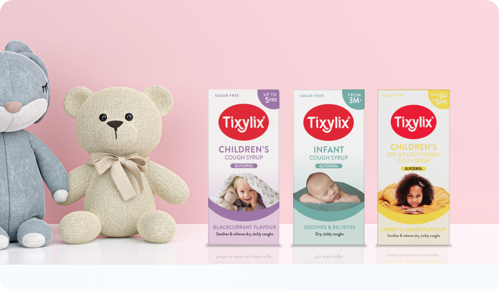How to help your child's cough at night: Tips and remedies for Babies, Toddlers & Kids
As a parent, there is no denying that it’s upsetting to see your little one feeling under the weather. When they have a cough, they are likely to wake up a lot more throughout the night, often disturbing the whole household - every parent’s worst nightmare!
Sometimes their cough can get worse at night. This is because when your child has a cold, the mucus from their nose and sinuses, or other irritants, can trickle down their throat and trigger their cough during sleep. Asthma can also trigger night-time coughs because airways tend to be more sensitive and irritable at night.
It can be stressful and exhausting if you are kept up during the night as a result of your little one being poorly, so we’ve put together six tips to help you handle your child coughing at night.

Our tips for soothing your child's night-time cough
Stick to a routine
We know this one is much easier said than done, but try to stick to your child’s regular routine as much as possible. Sticking to their usual everyday schedule, such as having the same meal times, bath times and bedtimes, will help to ensure consistency.
The routine will be reassuring for your little one and may help them to return to normal much more easily once they are feeling better. You’ll thank yourself when a full night’s sleep is on the cards again!
Run a warm bath before bed
Sometimes the best way to soothe a poorly child is simply to make them feel cared for and special. Feeling ill can make us all feel more vulnerable and children are no different in this respect. Running a lovely warm bath and spending some quality time chatting with them is a nice way for your little one to relax before bedtime.

Let your little one be close
Some parents may find it helpful to sleep in their toddler’s room so they can easily offer comfort during the night-time. If this isn’t comfortable or practical for you, making up a makeshift bed in your room for your little one may be the best way to comfort them if they can’t sleep. Do be wary of bringing your toddler into your own bed though, as this can be a difficult habit to break!
Soothe the symptoms of a dry or tickly cough with Tixylix
Tixylix can be used both day and night, so it’s suitable to use before bed to soothe your little one’s dry or tickly cough. Suitable for children aged 3 months to 5 years, Tixylix syrups provide a sugar-free coating for your child's throat, helping to relieve the symptoms of a dry or tickly cough.
Products that only contain paracetamol aren’t actually designed to help relieve coughs*. If your child is suffering from other cold symptoms, Tixylix can also be used alongside any paracetamol products.
Find out more about the Tixylix range and find out where to purchase a bottle.

Pillows to the rescue
Whilst in bed, prop up your little one with pillows so that their head is slightly raised. It’s easier for irritants to trigger their cough when they are lying down, sitting up will also help to drain any mucus away and ease discomfort.
A comfortable environment
Settling your little one down in a calm and comfortable environment will help them to sleep for longer. Try to keep the room airy without being draughty, and make sure it isn’t too warm as this is likely to make them feel worse.
Bedtime cuddles
When your little one is poorly they most likely want to feel cared for by those closest to them, so it’s important to give them plenty of TLC! Giving them lots of attention and cuddles before bed will help them to feel more relaxed and calm before they go to sleep.
Lying down with them or sitting next to their bed and reading a bedtime story might also help them drift off to sleep more easily and help to take their mind off being unwell. If you already have a bedtime routine, you can follow this to encourage your little one to wind down.

Most coughs clear up within three weeks, if your child’s cough lasts longer than three weeks, then get in touch with your GP.
Looking after a poorly child is extremely tiring, so make sure to rest while you can too, and try to get someone else to help you out so you can have regular breaks. Don’t forget - it will get better and we hope these tips help until your little one gets back to their happy, cheeky self again!
Share your top tips with us on Instagram or Facebook.
*Reference: https://www.ncbi.nlm.nih.gov/books/NBK279542/#:~:text=of%20the%20cold.-,Painkillers,can%20also%20lower%20a%20fever.




